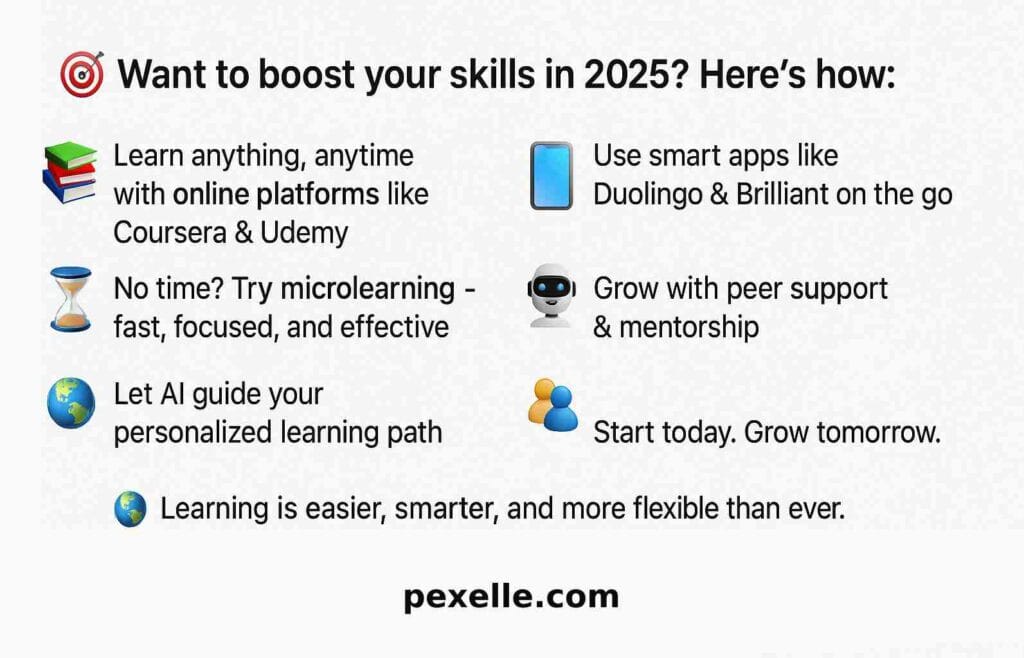New Methods and Tools for Skill Enhancement in the Digital Age

In today’s fast-paced and competitive world, the ability to adapt and learn continuously has become a vital asset. Whether you’re a student, a professional, or an entrepreneur, enhancing your skills is crucial to staying relevant. Fortunately, modern technology has revolutionized how we acquire knowledge and develop new abilities. From interactive online platforms to immersive tools like virtual reality, learning has never been more accessible or engaging.
1. Online Learning Platforms
One of the most prominent tools for upskilling is the rise of online learning platforms. Services like Coursera, Udemy, edX, LinkedIn Learning, and Skillshare offer courses on a wide variety of topics—from programming and marketing to art and wellness. These platforms provide:
- Flexible schedules for learners with busy lives
- Certificates of completion for credibility in job markets
- Expert-led instruction from top universities and professionals
- Community features like forums and peer reviews
Many of these platforms also use AI-powered recommendations to guide users toward courses that match their goals and interests.
2. Mobile Learning Apps
Mobile apps such as Duolingo for language learning or Brilliant for science and math make it easy to learn on the go. These apps often incorporate gamification, progress tracking, and personalized feedback to keep users engaged and motivated.
3. Microlearning and Bite-sized Education
Microlearning breaks information into small, focused chunks. This method is especially useful for busy professionals who can dedicate only a few minutes per day to learning. Platforms like Blinkist and Headway offer summaries of books, while others focus on quick tutorials or video lessons.
4. Virtual Reality (VR) and Augmented Reality (AR)
Immersive technologies like VR and AR are transforming training in industries like medicine, construction, and engineering. For example, VR simulations allow medical students to practice surgeries in a safe, realistic environment. These technologies help bridge the gap between theory and practice.
5. AI-Powered Personalized Learning
Modern tools now use AI to adapt content to an individual’s pace, preferences, and weaknesses. This results in a more customized experience. Platforms like Khan Academy, Quizlet, and Google Classroom implement intelligent features that enhance learning based on user performance.
6. Online Communities and Peer-to-Peer Learning
Forums, study groups, and mentorship platforms such as Reddit’s r/learnprogramming, Stack Overflow, or MentorCruise allow learners to interact with others, ask questions, and receive feedback. This fosters collaborative growth and deeper understanding.
7. Certification and Career-Focused Bootcamps
Bootcamps offer intensive, short-term training for high-demand skills, particularly in tech fields like software engineering, data science, and UI/UX design. Examples include General Assembly, Le Wagon, and Ironhack. These are designed to help learners transition into new careers quickly.
Conclusion
Skill development is no longer confined to traditional classrooms. With the wealth of digital tools and platforms now available, anyone can upgrade their abilities from anywhere in the world. Embracing these modern methods not only accelerates personal and professional growth but also opens up new opportunities in an ever-evolving job market.
Whether you’re learning a new language, mastering a software tool, or training for a new career, the tools to do so are right at your fingertips.
Source : Medium.com




